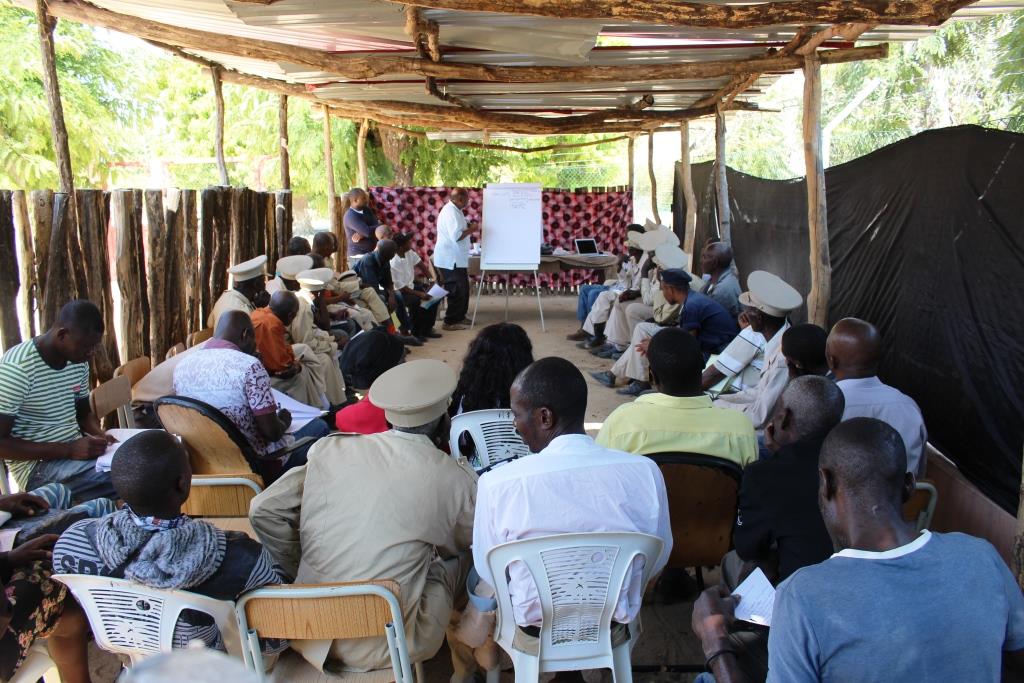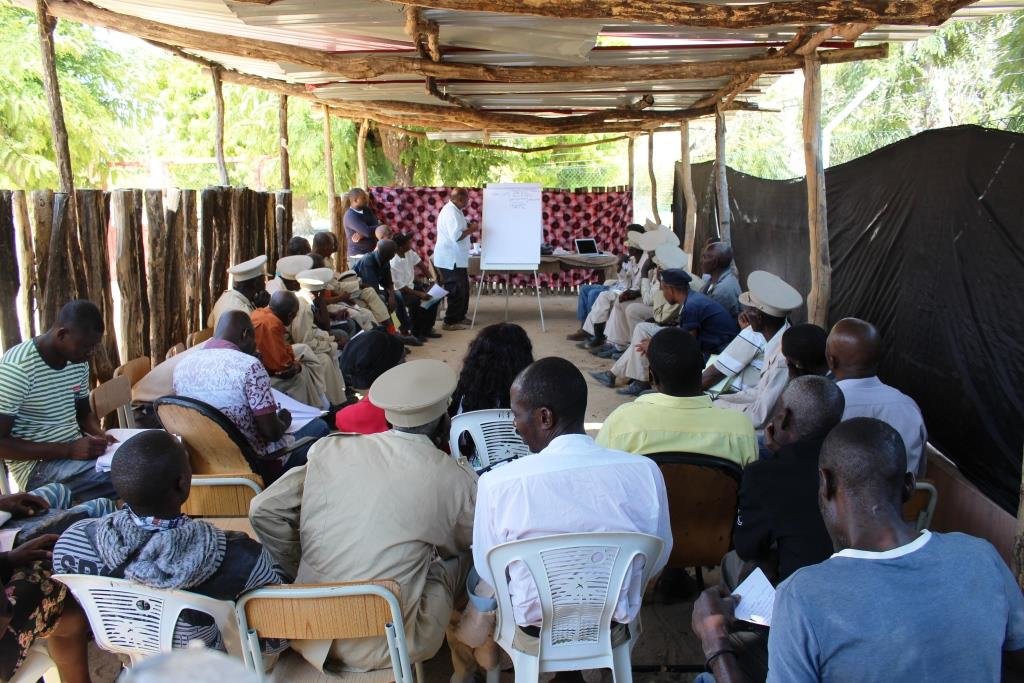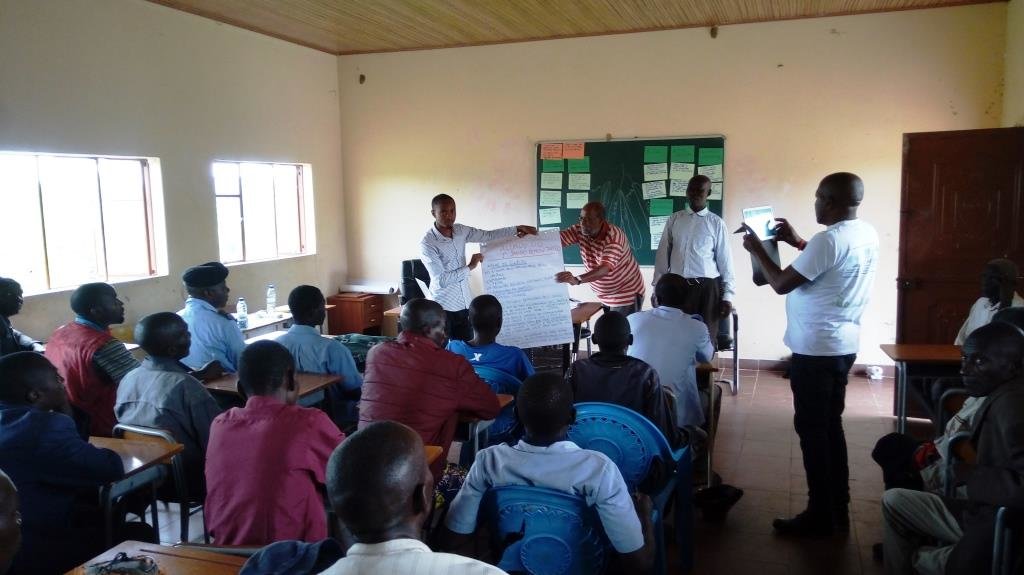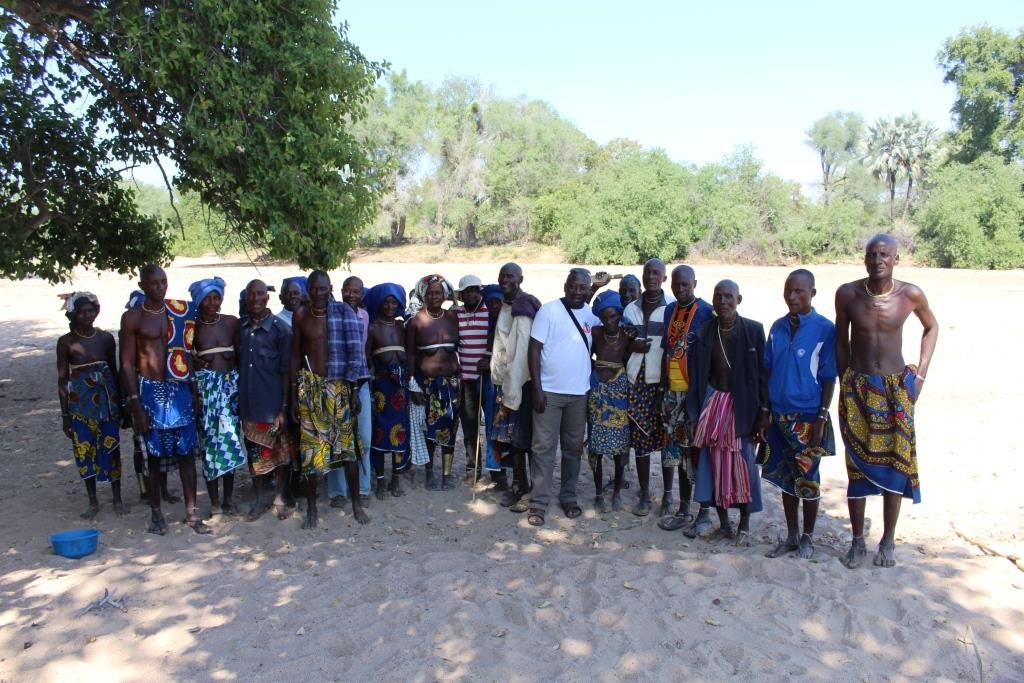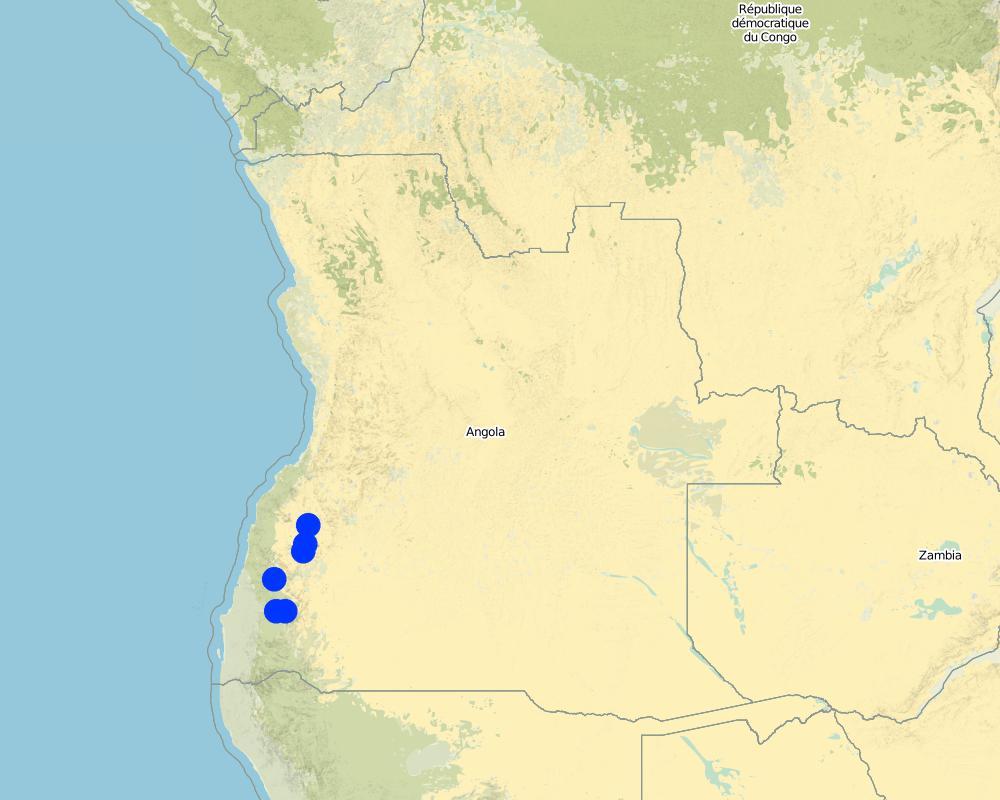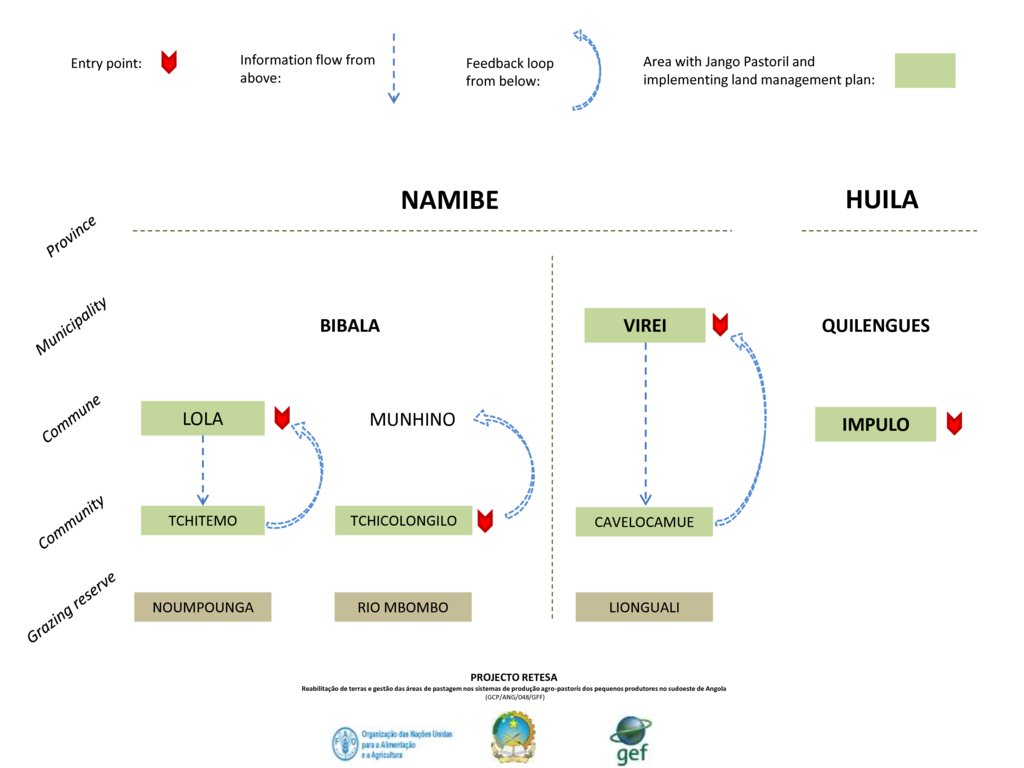Restoration of traditional pastoral management forums [Angola]
- Creación:
- Actualización:
- Compilador: Nicholas Euan Sharpe
- Editores: Txaran Basterrechea, David Tarrason
- Revisores: Rima Mekdaschi Studer, Barbara *, Donia Mühlematter
Jangos Pastoris
approaches_3173 - Angola
- Resumen completo en PDF
- Resumen completo en PDF para imprimir
- Resumen completo en el navegador
- Resumen completo (sin formato)
- Restoration of traditional pastoral management forums: 29 de enero de 2018 (inactive)
- Restoration of traditional pastoral management forums: 16 de febrero de 2018 (inactive)
- Restoration of traditional pastoral management forums: 12 de julio de 2018 (inactive)
- Restoration of traditional pastoral management forums: 2 de noviembre de 2021 (public)
Visualizar secciones
Expandir todo Colapsar todos1. Información general
1.2 Detalles de contacto de las personas de referencia e instituciones involucradas en la evaluación y la documentación del Enfoque
Especialista MST:
Nombre del proyecto que facilitó la documentación/ evaluación del Enfoque (si fuera relevante)
Reabilitação de terras e gestão das áreas de pastagem nos sistemas de produção agro-pastoris dos pequenos produtores no sudoeste de Angola (RETESA)Nombre de la(s) institución(es) que facilitaron la documentación/ evaluación del Enfoque si fuera relevante)
FAO Angola (FAO Angola) - Angola1.3 Condiciones referidas al uso de datos documentados mediante WOCAT
¿Cuándo se compilaron los datos (en el campo)?
21/12/2017
El compilador y la/s persona(s) de referencia claves aceptan las condiciones acerca del uso de los datos documentados mediante WOCAT :
Sí
2. Descripción del Enfoque MST
2.1 Breve descripción del Enfoque
The transhumance pastoral communities of Southern Angola traditionally held gatherings of chieftains and community leaders to discuss management of commonly held pastoral resources. However, the conflicts of the last century led to the breakdown in traditional governance and the majority of the traditional management systems were abandoned. The RETESA Project has supported their recovery as a way to reduce land degradation and improve local livelihoods.
2.2 Descripción detallada del Enfoque MST
Descripción detallada del Enfoque MST:
The Approach was developed and implemented through the RETESA Project “Land rehabilitation and rangelands management in smallholder agropastoral production systems in south western Angola”. RETESA is a project owned and implemented by the Ministry of Environment of the Government of Angola with technical and methodological assistance from The Food and Agriculture Organization of the United Nations (FAO), and financed by the Global Environment Facility (GEF).
From an early stage, RETESA identified management itself as the most effective tool to improve pastoral livelihoods and to reduce land degradation over large areas of land. However, the management terms and concepts used in conventional western cultures were difficult to convey to the pastoral communities. Thus communication of the needs and methods of appropriate grazing management were not fully understood and this led to confusion. After struggling initially with these challenges, the project technicians responsible for rangeland improvement and rehabilitation began to investigate the traditional management systems that were in place before the armed conflicts occurred. It was found that they adapted to modern rangeland management theory and practice and had a rich vocabulary which described in detail the timing and movements of the herds. Rather than teach a new way of viewing the natural world, the project's objective became one of resurrecting these lost systems and recuperating what was, in the communities' words, 'the ways of our elders'. In order to provide an underlying methodological basis which guided the process, the “Green Negotiated Territorial Development” (GreeNTD) methodology was introduced and used to negotiate the terms and agreements of the six management plans created and implemented during the process.
In essence, the role of the traditional management systems was to keep the animals in more remote, mountainous areas during the rainy season, the only time of year when water is available in these areas, and gradually bring them back to the lowland, river plains during the dry season. This simple system allowed for rangeland recovery and rest - and for agriculture to be practiced in the lowlands during the rainy season without the threat of intrusion by livestock, something which has become a constant source of conflict within the communities. The periods of 'recovery and rest' of the different areas also meant that important grasses and forage plants could grow, produce seed and multiply, something which was not occurring any longer, where the animals were now free to roam where they wished, returning to the same areas day after day and reducing ground cover to a bare minimum.
The modern discussion forums, or 'Jangos', are still traditional affairs run by traditional authorities and representatives from the communities. But they have adapted to include local Administrations and their technicians, as well as veterinarians, church leaders, NGOs, ranchers and farmers, so as to involve a broader range of stakeholders. The addition of these stakeholders and their involvement and approval of the decisions that come out of the forums are seen as key to the survival and effectiveness of the new management plans implemented.
2.3 Fotos del Enfoque
2.5 País/ región/ lugares donde el Enfoque fue aplicado
País:
Angola
Región/ Estado/ Provincia:
Province of Namibe and Huila
Especifique más el lugar :
Municipalities of Bibala, Virei and Quilengues
Map
×2.6 Fechas de inicio y conclusión del Enfoque
Indique año del inicio:
2015
Si no se conoce el año preciso, indique la fecha aproximada en la que se inició el Enfoque:
hace menos de 10 años (recientemente)
Comentarios:
The Project held its first Jango in December of 2015 and a total of 14 Jangos had been celebrated by the end of the project in April 2018.
2.7 Tipo de Enfoque
- The approach relies on a combination of Traditional Inputs and the RETESA Project support
2.8 Propósitos/ objetivos principales del Enfoque
To establish Jango Pastoril as institutions in strategic areas and use GreeNTD methodology to develop and implement six natural resource management plans that address the causes of land degradation, and improve production and local livelihoods.
2.9 Condiciones que facilitan o impiden la implementación de la/s Tecnología/s aplicadas bajo el Enfoque
normas y valores sociales/ culturales/ religiosos
- facilitan
There is a clear understanding of the benefits of recuperating the traditional social structures and management systems.
- impiden
Current cultural norms and socio-political systems hinder the recuperation of the traditional systems as they originally were; therefore, adaptations need to be applied to make them viable under current conditions.
disponibilidad/ acceso a recursos y servicios financieros
- impiden
The project ends in April 2018, at which point the Jangos must be self-sufficient and self-operating. Given the current economic crisis, this will be a challenge.
entorno institucional
- facilitan
Most of the Municipal governments and community leaders involved have invested in the approach and wish to continue with the forums.
- impiden
Pastoral, nomadic lifestyles are seen as a threat to education and prosperity by some institutions operating in the country, and the forums could be seen as a way of preserving pastoral culture.
colaboración/ coordinación de actores
- facilitan
The pastoral communities are fully aware of the land degradation and challenges they face, and see the Jango Pastoril forums as a way to address these challenges.
- impiden
Communication has improved through the forum structure, though collaboration within communities for common benefit is still on the whole uncommon and could threaten the sustainability of the plans agreed by the forums. Some communities also fear that improvements in land productivity or infrastructure could lead to land being seized by more powerful actors.
marco de trabajo legal (tenencia de tierra, derechos de uso de tierra y agua)
- impiden
Land and water rights were not addressed during the forums and are still unclear in the majority of locations these forums are operating. The land management plans were based on maintaining the 'status quo' currently operating in the area.
políticas
- facilitan
The RETESA Project has succeeded in presenting traditional livestock management and transhumance movements in a positive light and is working with the Angolan Government to improve policies directed at livestock and herder movement throughout the transhumance migration routes, at community, regional and national levels.
- impiden
Pastoral cultures are still seen by many in power as a threat to education and economic prosperity.
gobernanza de tierras (toma de decisiones, implementación y aplicación)
- impiden
There still remains much to be done in the area of land governance, from decision-making, implementation and especially enforcement.
conocimiento de MST, acceso a apoyo técnico
- impiden
Very little is known about SLM, and technical support is lacking at community and municipal levels.
mercados (para comprar insumos, vender productos) y precios
- impiden
The more traditional tribes rarely sell their animals to local markets, leading critics to claim that their way of life contributes little to the local or national economies.
carga de trabajo, disponibilidad de mano de obra
- facilitan
There is a vast pool of young people able to work.
- impiden
Manual labour is most often carried out by the women of the family, and those under 18 years are responsible for caring for the animals and following them on their daily search for pasture and water.
3. Participación y roles de las partes interesadas involucradas
3.1 Partes interesadas involucradas en el Enfoque y sus roles
- usuarios locales de tierras/ comunidades locales
Originally it was just the community chiefs and respected livestock producers who took part in the Jango Pastoril meetings, though the modern version also includes Administrators and their staff, Administrative technicians, veterinarians, ranchers, church leaders, NGOs and farmers.
Given that it is the local land users and communities who manage the land on a daily basis, it is their role to fully understand the issues being debated and how the new management plans will affect them. This is usually done through a community Jango Pastoril forum run by the project and traditional leaders who participate in the Municipal Forums, with the support of the local Administrations. In the community Jango Pastoril, the decisions taken at a Muncipal level are presented, opinions are expressed and the plans are modified or agreed upon. Community feedback is then presented by the traditional leaders at the next Municipal Jango Pastoril where it is recorded and taken into consideration, with the necessary adaptations being introduced.
- organizaciones comunitarias
Agropastoral Farmer Field School (APFS) Facilitators and Members. Representatives from the Agricultural Development Iniciatives. Local Church Representatives.
The community-based organisations participate in the discussions and speak for those they represent. Many times they are the ones who support the Administrations in the communication or implementation of the decisions made in the forums.
- especialistas MST/consejeros agrícolas
FAO national and international consultants. Administrative agricultural and livestock technicians Veterinarians and Animal Health Workers.
Provide technical support to discussions and provide feedback on local issues.
- ONG
Local and National NGOs.
Their role will most likely depend on the objectives of the participant NGO, but often lines of collaboration are easily established.
- sector privado
Representitives from local ranches and private holdings.
Often the owners are far from the land, and send their local managers to participate, though they have often have little decision-making capacity. However, their presence and opinion should be sought.
- gobierno local
Municipal and Communal Administrations and their representittives.
Co-coordinate the organisation and logistics of the Jango Pastoril forums. Participate as a stakeholder in the meetings and give feedback and administrative approval of the decisions taken. The Municipal and Communal Administrations usually have the final word on any decisions made so they must actively participate in the meetings.
- organización internacional
Project 'RETESA', FAO Angola.
FAO Angola was responsible for supporting the Angolan Government in its design and execution of the Global Environment Funded 'Project RETESA'.
Si varias partes interesadas estuvieron involucradas, indique la agencia principal:
Project 'RETESA', FAO Angola was the lead agency, though plans are for the Municipal Forums to be self-suficient in 2018.
3.2 Involucramiento de los usuarios locales de tierras/ comunidades locales en las distintas fases del Enfoque
| Involucramiento de los usuarios locales de tierras/ comunidades locales | Especifique quién se involucró y describa las actividades | |
|---|---|---|
| iniciación/ motivación | interactivo | The first meetings and forums were organised by the Municipal Administrations and the Retesa Project, picking up from previous attempts at organising discussion forums to manage commonly held natural resources. |
| planificación | interactivo | Once Jango Pastoril were well established, the decision-making process was transferred to them, with technical support being provided by the SLM specialists and with the Municipal Administrators having final word. |
| implementación | interactivo | The implementation of the decisions made was based on their type and complexity and often depended on input and action from various stakeholders. Where possible, external support in the form of technical knowledge, materials, food, machinery, etc. were organised to support the agreed upon activities and works. |
| monitoreo y evaluación | apoyo externo | At the current stage, monitoring and evaluation is being carried out by the RETESA Project and the supporting Administrations. In the best case scenario, monitoring and evaluation would be carried out by the Jango Pastoril themselves, though external support would most likely be needed, at least until the process is well understood by the forum participants. |
3.3 Flujograma (si estuviera disponible)
Descripción:
As the initial processes had different entry points and acted at different administrative levels, a graphic representation of the process can be seen in the flow chart provided. Readers are asked to focus on the entry points and how each situation developed, rather than focus on the specific names of the areas.
The Approach has overseen the creation of five Jango Pastoril, each with their own contexts and stakeholders, which are highlighted in the flow chart in green. By introducing and implementing the GreeNTD methodology, the five Jango Pastoril also debated and approved land management plans with administrative and community support, which in some cases allowed for the creation of large grazing reserves. The sixth and final plan is the combination of the 5 plans into an encompassing plan which serves a large part of the principal transhumance migration route.
Autor:
Projecto RETESA 2018
3.4 La toma de decisiones en la selección de Tecnología(s) MST
Especifique quién decidió la selección de las Tecnología/ Tecnologías a implementarse:
- todos los actores relevantes, como parte de un enfoque participativo
Explique:
FAO representatives facilitated the Forums, though decision-making and proposals came largely from the Forum participants themselves. SLM specialists did make clear their opinions and helped the group reach viable decisions on the use and adequacy of the technologies to be implemented.
Especifique las bases que sustentaron la toma de decisiones:
- la experiencia personal y opiniones (no documentadas)
- The traditional management system used before the conflicts of the XX century provided important inputs to the final land management plans.
4. Apoyo técnico, fortalecimiento institucional y gestión del conocimiento
4.1 Construcción de capacidades / capacitación
¿Se proporcionó la capacitación a usuarios de tierras/ otras partes interesadas?
Sí
- Forum participants
Si fuese relevante, también especifique género, edad, estatus, etnicidad, etc.
Principaly male (livestock is male centred enterprise in the area, except for chickens and pigs), 40 to 60 years of age, leader/authority within the community and their is generally a mix of tribal backgrounds. Administrative representatives were more variable in gender, background and ethnicity.
Forma de capacitación:
- reuniones públicas
Temas avanzados:
Animal health and nutrition; native pasture and rangeland management; water management & illnesses (both human and animal); integrated landscape design and planning; development and governance of Community Management Forums.
Comentarios:
The first 2 Forums celebrated in each area opened with 2 hours of training and education. After the trainings sessions, the current livestock and rangeland management model was discussed and the members of the Forum proposed different ways of adapting current management to improve both grassland/rangeland health, as well as addressing current social conflicts arising from animal production issues (children not attending school to care for animals; livestock invading agricultural crops; animal theft; lack of administrative support). The following Forum sessions do not usually include training, but centre on consolidating previous agreements, developing management plans and assigning task to be carried out, with supervision from local authorities and Municipal representitives.
4.2 Servicio de asesoría
¿Los usuarios de tierras tienen acceso a un servicio de asesoría?
Sí
Especifique si servicio proporcionado se realizó:
- en los campos de los usuarios de tierras
Describa/ comentarios:
The Jango Pastoril have limited ability to provide advisory services, but they can be used by participants to find and meet those who can provide assistance.
4.3 Fortalecimiento institucional (desarrollo institucional)
¿Se establecieron o fortalecieron instituciones mediante el Enfoque?
- sí, moderadamente
Especifique el nivel o los niveles en los que se fortalecieron o establecieron las instituciones:
- local
Describa la institución, roles y responsabilidades, miembros, etc.
Creation of the Jango Pastoril as an institution in its own right has led to important benefits. Local, communal and municipal institutions have also been strengthened and provided with a direct link to the pastoral communities.
Especifique el tipo de apoyo:
- construcción de capacidades/ entrenamiento
Proporcione detalles adicionales:
The Jango Pastoril approach, underpinned by the GreeNTD Methodology, stands as an example of involving local people in decision-making processes around commonly held natural resources. Local and Municipal authorities have benefited by experiencing and overseeing much of the process.
4.4 Monitoreo y evaluación
¿El monitoreo y la evaluación forman parte del Enfoque?
Sí
Comentarios:
The idea is that the regularly scheduled Jango Pastoril are to act as monitoring bodies for the land management plans, evaluating results and taking action to correct mistakes or adapt to new conditions. However, for the most part it will be the Municipal authorities who decide whether the process is working and whether to continue with them or not.
Si respondió que sí, ¿la documentación se utilizará para monitoreo y evaluación?
No
4.5 Investigación
¿La investigación formó parte del Enfoque?
No
5. Financiamiento y apoyo material externo
5.1 Presupuesto anual para el componente MST del Enfoque
Indique el presupuesto anual para el componente del MST del Enfoque (en US$):
2200,00
Si no se conoce el presupuesto anual preciso, indique el rango:
- < 2,000
Comentarios (ej. fuentes principales de financiamiento/ donantes principales):
It costs about US $500 to organise and fund a Municipal Forum, about US $200 for a Community Forum. Theoretically, there should be around 2 Muncipal Forums and 6 Community Forums per year per Municipality.
5.2 Apoyo financiero/material proporcionado a los usuarios de tierras
¿Los usuarios de tierras recibieron financiamiento/ apoyo material para implementar la Tecnología/ Tecnologías? :
No
5.3 Subsidios para insumos específicos (incluyendo mano de obra)
- ninguno
Si la mano de obra de usuarios de tierras fue un insumo sustancial, ¿fue:
- voluntario?
Comentarios:
Breakfast, Lunch and Drinks were provided by the Project RETESA during the Municipal Forums (as many had travelled far to attend). Breakfast and Drinks were provided at the Community Forums by the Project.
5.4 Crédito
¿Se proporcionó crédito bajo el Enfoque para actividades MST?
No
5.5 Otros incentivos o instrumentos
¿Se usaron otros incentivos o instrumentos para promover la implementación de Tecnologías MST?
No
6. Análisis de impacto y comentarios de conclusión
6.1 Impactos del Enfoque
¿El Enfoque empoderó a los usuarios locales de tierras, mejoró el involucramiento de las partes interesadas?
- No
- Sí, un poco
- Sí, moderadamente
- Sí, mucho
In most cases, there are no community forums or public spaces for locals to voice their opinions. By creating the Jango Pastoril forums, participant land users and their representatives were able to voice their concerns and propose solutions.
¿El Enfoque facilitó la toma de decisiones basada en evidencia?
- No
- Sí, un poco
- Sí, moderadamente
- Sí, mucho
Experience in the area has shown that presenting 'scientific evidence' to communities with little formal education can produce interesting interpretations and consequences. Most decisions in pastoral communities are based on past experience, social conventions and emotions. However there is significant collective memory that has allowed for the evidence of land degradation and climate change to become clear and better decisions are being made.
¿El Enfoque ayudó a los usuarios de tierras a implementar y mantener Tecnologías MST?
- No
- Sí, un poco
- Sí, moderadamente
- Sí, mucho
Yes, the approach did help land users implement and improve upon current practices. However, the Jango Pastoril forums were not created as a purely educational environment and they depended on the participants having enough experience and knowledge to provide adequate feedback and make proper decisions.
¿El Enfoque mejoró la coordinación e implementación efectiva en costos de MST?
- No
- Sí, un poco
- Sí, moderadamente
- Sí, mucho
Coordination was improved at various public and administrative levels, though the forums as an institution are still in their early stage.
¿El Enfoque movilizó/mejoró el acceso a recursos financieros para implementar MST?
- No
- Sí, un poco
- Sí, moderadamente
- Sí, mucho
Funding has been sought for water point improvement works yet none has materialised to date.
¿El Enfoque mejoró el conocimiento y capacidades de los usuarios para implementar MST?
- No
- Sí, un poco
- Sí, moderadamente
- Sí, mucho
As the first Jango Pastoril forums in each area did include 2 hours of education on proper rangeland and natural resource management, some knowledge and capacity building was part of the process.
¿El Enfoque mejoró el conocimiento y capacidades de otras partes interesadas?
- No
- Sí, un poco
- Sí, moderadamente
- Sí, mucho
The exchange of points of view and communication between the different stakeholders improved the collective knowledge of traditional production systems and the challenges each group faces.
¿El Enfoque construyó/ fortaleció instituciones, colaboración entre partes interesadas?
- No
- Sí, un poco
- Sí, moderadamente
- Sí, mucho
The Jango Pastoril forums were the first organised events that brought these different stakeholders to the table to discuss key issues surrounding commonly held natural resources.
¿El Enfoque mitigó conflictos?
- No
- Sí, un poco
- Sí, moderadamente
- Sí, mucho
The Jango Pastoril discussed and dealt with various sources of conflict in the local areas where they were held. In some cases, solutions were found and agreed upon; however, some conflicts were best left in the hands of the relevant authorities, though suggestions and proposals were gathered and presented to Administrative authorities present.
¿El Enfoque empoderó a grupos en desventaja social y económica?
- No
- Sí, un poco
- Sí, moderadamente
- Sí, mucho
Pastoral herders often enjoy a certain amount of standing within their communities, and the majority of the participants were elder male members of the communities. Women farmers and widows were often invited but were overall under-represented in the forums. This is clearly an area of improvement for future interventions.
¿El Enfoque mejoró la equidad de género y empoderó a las mujeres y niñas?
- No
- Sí, un poco
- Sí, moderadamente
- Sí, mucho
Although a number of women hold high positions within the Provincial and Municipal governments and took part in the forum discussions as administrative representatives, for the most part the participants in the forums were elderly men of standing.
¿El Enfoque alentó a jóvenes/ la siguiente generación de usuarios de tierras a involucrarse con MST?
- No
- Sí, un poco
- Sí, moderadamente
- Sí, mucho
A small percentage of young males took part in the forums. As they mostly care for the livestock, it would be good to improve their participation rates in future events.
¿El Enfoque mejoró cuestiones de tenencia de tierra/ derechos de usuarios que obstaculizaron la implementación de la Tecnologías MST?
- No
- Sí, un poco
- Sí, moderadamente
- Sí, mucho
Land rights and tenure were not addressed either by the forums or the Project. The land management plans created and implemented maintained the 'status quo' currently operating in the area.
¿El Enfoque resultó en mejor seguridad alimentaria/ mejoró la nutrición?
- No
- Sí, un poco
- Sí, moderadamente
- Sí, mucho
The land management plans should produce improved animal production rates and reduce livestock invasions of crops, leading to improved food security and nutrition.
¿El Enfoque mejoró el acceso a los mercados?
- No
- Sí, un poco
- Sí, moderadamente
- Sí, mucho
Sales of livestock is still a sensitive issue in the area and this topic did not form part of the discussions.
¿El Enfoque llevó a un acceso mejorado a tierra y saneamiento?
- No
- Sí, un poco
- Sí, moderadamente
- Sí, mucho
Water harvesting and access was a common topic and a list of priority areas and works was prepared and presented to Communal and Municipal Administrations, leading to a number of access and storage improvement activities.
¿El Enfoque llevó a un uso más sostenible/ fuentes de energía?
- No
- Sí, un poco
- Sí, moderadamente
- Sí, mucho
Charcoal production and its effects on the area was raised and debated a number of times but no agreements or solutions were found.
¿El Enfoque mejoró la capacidad de los usuarios de tierras a adaptarse a los cambios climáticos/ extemos y mitigar desastres relacionados al clima?
- No
- Sí, un poco
- Sí, moderadamente
- Sí, mucho
The creation of large-scale grazing reserves and institutions that allow for debate and adaptation of management to increasing changes should lead to an improved capacity to adapt to changes in the climate.
¿El Enfoque llevó a oportunidades de empleo, ingresos?
- No
- Sí, un poco
- Sí, moderadamente
- Sí, mucho
6.2 Motivación principal del usuario de la tierra para implementar MST
- producción incrementada
Recuperating large grazing reserves and planning animal movements to allow for rangeland recovery and growth will bring about increased production. What remains to be seen is if the managment plans are respected and enforced.
- reducción de la degradación de la tierra
Improper livestock management is the leading cause of land degradation in the area and the Jango Pastoril and the managment plans created deal directly with this problem.
- costumbres y creencias, moral
By reinstating the traditional systems, support and understanding for the 5 land management plans was easily appropriated and communicated. The adaptation of the Jango Pastoril to its modern form was also appropriated with ease.
- mitigación de conflicto
The Impulo management plan dealt directly with 2 conflicts that were of concern to the local communities, which were invasion of crops by livestock, the closing of the traditional water point access points by new cropping land. The plan created was more an communal ordinance and required that livestock be accompanied by a herder during the day and corraled at night and that those who encroached on traditional livestock routes and water access points would be given 1 growing season to open the routes and access points.
6.3 Sostenibilidad de las actividades del Enfoque
¿Pueden los usuarios de tierras sostener lo que se implementó mediante el Enfoque (sin apoyo externo)?
- sí
Si respondió que sí, describa cómo:
Given coordination and willingness, the communities and Administrations have the resources needed to continue on with Approach as it has been, albeit without the technical and logistical support given by the project until this point. In any case, the process has shown to be well accepted.
6.4 Fortalezas/ ventajas del Enfoque
| Fuerzas/ ventajas/ oportunidades desde la perspectiva del usuario de la tierra |
|---|
| Through the Jango Pastoril, land users now have available an instrument to voice opinions and bring attention to issues affecting pastoral communities and the natural resources they depend on. |
| It brings people in contact with decision-makers and others who play important roles in community affairs. |
| The Jango Pastoril also serve as a source of information, for example, information on water and pasture availability, on livestock theft, on the Administrations point of view on key issues and priorities, on new projects or programmes |
| Fuerzas/ ventajas/ oportunidades desde la perspectiva del compilador o de otra persona de referencia clave |
|---|
| The Jango Pastoril brings together a diverse and important group of stakeholders who normally wouldn't meet with the objective of addressing rangeland management and livestock issues. In doing so, it brings attention to a number of serious problems affecting the base of local livelihoods and promotes understanding and collaboration between those present and the communities they represent. |
| It is one of the few ways to directly deal with the root cause of land degradation, which in this case is the cause is poor land management. It was management processes which drove the land degradation, and land management should equally be the tool used to address the problems. The land management plans created through the Jango Pastoril hopefully return things to a process by which the land was productive and supported a wide array of life. |
| It creates an institution whose formalities and objectives are easily understood and appropriated by locals. This institution deals with issues that are of a common concern and that should be receiving more attention than they are. |
| The Jango Pastoril and the commonly agreed land management plans they produced add weight to the argument for maintaining the commons for public use and grazing. By entering into agreements and producing management plans that improve local resources, the communities can show unity and argue against those that want to divide and privatise land in the area. |
6.5 Debilidades/ desventajas del Enfoque y formas de sobreponerse a ellos
| Debilidades/ desventajas/ riesgos desde la perspectiva del usuario de la tierra | ¿Cómo sobreponerse a ellas? |
|---|---|
| It can require a lengthy trip and an overnight stay for participants who have to travel from isolated communities. | The Jangos were scheduled at the same time as other key events and meetings, so as to reduce costs and travel. The Municipal and Communal Administrations usually found accommodation for those that had to stay the night. |
| The issues discussed and decisions made will have outcomes that will affect some land users. Obviously, there are those that are benefiting from the current situation and they will try and ensure that things remain as they are. | The GreeNTD methodology discussed earlier has a well-established system for involving all stakeholders, assessing their motivations and publically producing a viable plan that addresses key issues. |
| The withdrawal of logistical and technical support by the RETESA Project will affect the Jango Pastoril forums. | Approach other projects coming into the area and find other funding opportunities to continue to support the growth of the forums. |
| Debilidades/ desventajas/ riesgos desde la perspectiva del compilador o de otra persona de referencia clave | ¿Cómo sobreponerse a ellas? |
|---|---|
| The Jango Pastoril do little to improve the situation of the disadvantaged members of the population, or to improve gender equality. In other words, they perpetuate current cultural power bases. | Explore ways with the Jangos of bringing in more farmers and women into the discussions. Or create 'Jango Campones' which deal with cropping issues and land rights. |
| The Jango Pastoril do little to address land ownership issues or land rights. | It should be the Jango that ask for help on this issue, but the Jango Pastoril have proven to be in favour of the rangelands being open and available for community grazing. |
| Enforcement of laws and regulations is not always easy in such isolated territory. | Establish protocols and systems for dealing with offenders that are known to the local authorities and support all attempts to communicate the plans to land users and invite their feedback. |
7. Referencias y vínculos
7.1 Métodos/ fuentes de información
- visitas de campo, encuestas de campo
- entrevistas con usuarios de tierras
7.3 Vínculos a la información relevante disponible en línea
Título/ descripción:
FAO in Action: Using indigenous knowledge to reverse land degradation in Angola.
URL:
http://www.fao.org/in-action/using-indigenous-knowledge-to-reverse-land-degradation-in-angola/en/
Vínculos y módulos
Expandir todo Colapsar todosVínculos
No hay vínculos
Módulos
No se hallaron módulos


